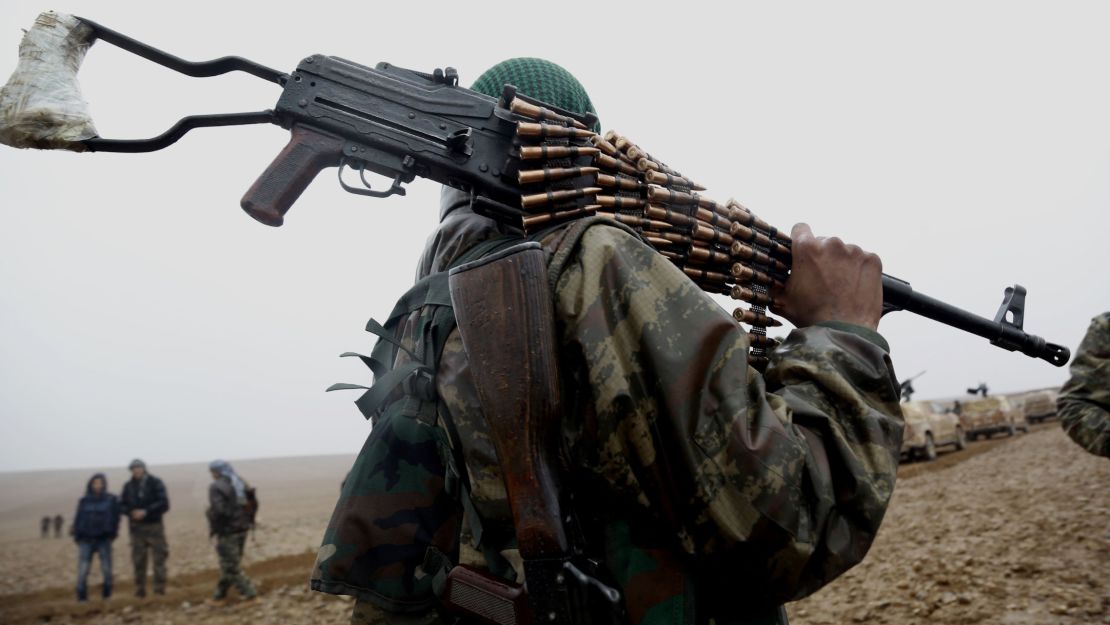Story highlights
Turkish Foreign Minister says every weapon sent is 'a threat to Turkey'
The Obama administration had long supported Kurdish fighters in Syria
Turkey has lashed out at Washington’s plan to send arms to Kurdish rebels fighting ISIS in Syria, calling for an end to the US strategy that has long rattled Ankara.
The Pentagon announced Tuesday that President Donald Trump had authorized arming the Kurdish People’s Protection Units (YPG), green-lighting a US policy that had sat on the backburner for years to avoid confrontation with Turkey, a key NATO ally.
It said that the provision of supplies and weapons was aimed at aiding the only group it sees fit enough to retake the Syrian city of Raqqa, the ISIS group’s de facto capital, in the near future.
The YPG is part of the Syrian Democratic Forces, a coalition of rebel fighters that Washington considers its main ally in the country. But Ankara sees the YPG as a terrorist organization threatening Turkish sovereignty.
A US official said that small arms, machine guns, construction equipment and armored vehicles were among the provisions.
“Every weapon that they deliver is a threat to Turkey,” Turkish Foreign Minister Mevlut Cavusoglu told reporters, according to state-run media Anadolu.

He repeated government claims that the YPG was simply a Syrian extension of theoutlawed Kurdistan Workers Party (PKK), which both Turkey and the US consider a terrorist organization. The PKK has waged an insurgency in southern Turkey since the 1980s.
Analysis by CNN's Arwa Damon in Istanbul
“Weapons given to the YPG end up in the hands of the PKK. The American administration knows well what we think about this,” he said.
Turkish Prime Minister Binali Yildirim said the decision was unacceptable and asked the US to reverse its decision.
“If the opposite decision is made, the consequences will bring negative outcomes, not only for Turkey but also for America,” Anadolu quoted him as saying.
Ankara has repeatedly warned it will do whatever is necessary to prevent an official Kurdish region developing near its border with Syria, pointing to Iraqi Kurdistan, the semi-autonomous Kurdish region in northern Iraq.
Pentagon chief spokesperson Dana White tried to allay Turkey’s concerns, saying that the the United States fully supported returning Raqqa to Syrian Arabs, not the Kurds.
“We do not envision (that) a long-term YPG presence and governance in the city is acceptable or consistent with the wishes of the local population,” she said.
“We want to reassure the people and government of Turkey that the US is committed to preventing additional security risks and protecting our NATO ally.”
She added that equipment provided to the SDF would be “limited, mission-specific, and metered out incrementally as objectives are reached.”
Defense Secretary James Mattis also tried to calm the storm, saying that the US and Turkey have had open discussions about the issue.
“I’m not concerned at all about the NATO alliance and the relations between our nations. It’s not always tidy, but we work out the issues.”
A YPG spokesman welcomed what he called a “historical decision” and said it was a symbol of confidence in the rebel group’s abilities.
“YPG proved to the whole world, especially to the international coalition forces, that it is the main force fighting against terrorism. Before this decision of the United States, our forces have had deficiencies for a long time.”
Turkey-US tensions rise
The Pentagon’s announcement comes just a week before Turkish President Recep Tayyip Erdogan’s May 16 meeting with Trump at the White House. Erdogan will no doubt push for the US to drop its support for the YPG.
It also comes as the Trump administration mulls sending up to 5,000 more troops to Afghanistan, continuing a 15-year war that has frustrated some Americans tiring of US involvement in Middle Eastern and South Asian conflicts.
Washington’s support for the YPG began under the Obama administration and has driven a wedge between the US and Turkey, which often coordinate their military actions in Syria.
The US sees the 50,000-strong SDF as the most effective force fighting ISIS in Syria and has armed the non-Kurdish Arab elements of that group for some time. Syrian Kurds make up slightly more than half of the SDF, according to the US military.
But arming the Kurds’ Arab allies was widely seen as a way for the Obama administration to indirectly, or quietly, arm Kurdish elements as well without upsetting Turkey.
Turkish Deputy Prime Minister Nurettin Canikli earlier criticized the US announcement to arm the YPG as a mere continuation of Obama’s strategy.
“We believe, we hope, that the American administration will say no to this wrongdoing and give up this policy. This policy will not bring any benefit to anybody,” Canikli told Turkey’s A Haber news channel.
“You can not be in the same sack with terror organizations.”
Tensions between the two countries over Kurdish forces have flared several times over the years, most recently in April, when Turkish airstrikes killed at least 25 members of the YPG and the Kurdish Peshmerga.
The US responded to this strikes by carrying out joint patrols with the YPG, at the strike area on the Syria-Turkey border. Turkish officials said they were “upset” seeing US flags flying with the YPG’s at its doorstep.










